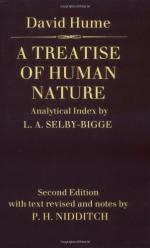
|
Book 1, Part 1, Of Ideas, Their Origin, Composition, Connexion, Abstraction, Etc.
1. Which of the following best defines empiricism?
(a) Our knowledge of the world comes entirely from our parents.
(b) Our morals are not truly our own thoughts.
(c) Our knowledge of the world comes enitirely through experience.
(d) The government should have control over our lives.
2. Into what does Hume divide knowledge?
(a) Definitions and observations.
(b) Pride and prejudice.
(c) Passions and reason.
(d) Vice and virtue.
3. Which of the following best describes Hume's idea of a definition?
(a) Something that is formed from our own ideas.
(b) Something that comes from the universal truth.
(c) Something that is trivially true.
(d) Something we have been told as children and have grown to believe.
4. From where does a human's substantive knowledge come?
(a) Society.
(b) Human senses.
(c) Religion.
(d) Human passion.
5. Hume say the human mind resolves itself into what distinct kinds ?
(a) Love and hate.
(b) Pride and prejudice.
(c) Impressions and ideas.
(d) Images and words.
6. Hume says everyone can feel the difference between what?
(a) Feeling and thinking.
(b) Images and words.
(c) Impressions and ideas.
(d) Women and men.
(read all 180 Multiple Choice Questions and Answers)
|
This section contains 4,111 words (approx. 14 pages at 300 words per page) |

|




